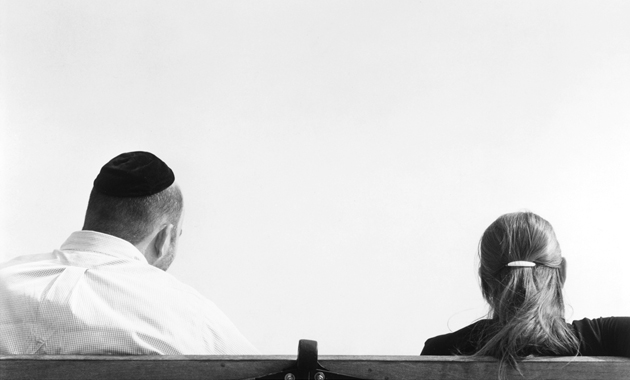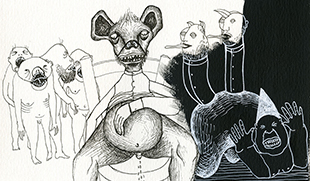[stream flv=x:/012fae3308.url-de-test.ws/wp-content/uploads/PORTFOLIO/FRANCOISE DOCQUIERT/Khaled Jarrar/ISoldierBD.flv img=x:/012fae3308.url-de-test.ws/wp-content/uploads/PORTFOLIO/FRANCOISE DOCQUIERT/Khaled Jarrar/Jarrar169.jpg hd=x:/012fae3308.url-de-test.ws/wp-content/uploads/PORTFOLIO/FRANCOISE DOCQUIERT/Khaled Jarrar/ISoldierHD.flv mp4=x:/012fae3308.url-de-test.ws/wp-content/uploads/PORTFOLIO/FRANCOISE DOCQUIERT/Khaled Jarrar/ISoldieriphone.mp4 embed=false share=false width=450 height=253 dock=true controlbar=over bandwidth=high autostart=false /]
Among the last things you’d expect to see in a gallery is postage stamps and an artist who is a professional soldier. Now, I don’t have much affinity with armies anywhere, but I was really bowled over by the work of Khaled Jarrar, represented by Bernard Utudjian’s Polaris gallery in Paris.
Kahled Jarrar is a talented artist, but also a singular one in several ways: he is Palestinian and has made no attempt to get away from his homeland (he lives and work in Ramallah); he is also a captain in the unarmed Palestinian Presidential Guard. While his work is certainly political in its constant critique and derision of domination in any form, its materials also appeal to the senses. His works are an ideal vehicle for thinking, analyzing and articulating his ideas.
The land is the major element. Palestine. Jarrar’s performances, videos, photographs and sculptures all explore its isolation, manifesting his faith in the image’s ability to reveal oppression.
Voyage 110 – Journey 110 (2009) shows Palestinian men and women getting past the wall running between Jerusalem and the West Bank by taking a secret tunnel. It is a raw, uncompromising document. His most recent creation, Infiltrators, winner of two prizes at the Dubai Festival in 2012, explores the same theme in a 70-minute film.
In Soldier (2011) Jarrar moves away from pure narrative. Filmed from a low angle, a military parade become a frighteningly homogenous block of movement denying any kind of individuality. The power of the work is heightened by the play on shadow and the geometry of forms.
Other works use mockery. Wet Suit is an ironic video in which a man in a frog suit hunts for water in the streets of Ramallah, a place where that resource is as valuable as gold. At the Paris FIAC in 2012 Jarrar caught the attention with a cement football extracted from the separating wall between Israel and the West Bank.
On 30 November 2012 the General Assembly of the United Nations granted Palestine the status of non-member observer state. This was an important event for Jarrar, who seems to have anticipated it with the “State of Palestine” stamps that he created in 2010, using the postal service online programme for creating stamps. Accepted by the Dutch and German post offices, his stamps were rejected by France. He also invented an “official” Palestinian stamp which he applied to the passports of (willing) tourists at the 2011 FIAC and at the Berlin Biennale in 2012. In 2011 he built a Ramallah bus station (West Bank). In these pieces, Jarrar reaches beyond traditional art-world confines to directly engage the viewer.
The political energy of this prolific artist’s work comes not only from its subjects, but also from the emotions it inspires by putting us in direct contact with another world and the sufferings of its people. If his art references topical problems, it is effective above all because it allows us to enter and find our place in the world it presents. The artist, an active participant in his country’s history, plays with great intelligence on art’s ability to engage the viewer.
Françoise Docquiert, 2013
Khaled Jarrar : State of Palestine, planches de timbres sérigraphiées, édition limitée, 2011©Khaled Jarrar, GaleriePolaris
Khaled Jarrar was born in Jenin, Palestine. Following the family tradition, he started life as a carpenter, working in Nazareth (Israel), before studying Interior Design at the Palestine Polytechnic University and enrolling in the Art School of Ramallah in its first year. He graduated in 2011, and the following year his film Infiltrators won the FIPRESCI prize for best documentary director and the Special Jury Prize at the Dubai International Film Festival
In addition to his artistic activities, Khaled Jarrar is a captain in the (unarmed) Palestinian Presidential Guard. He lives and works in Ramallah.
Links
Khaled Jarrar, Galerie Polaris
Khaled Jarrar, « Stamp for Palestine »
« Live and work in Palestine »


